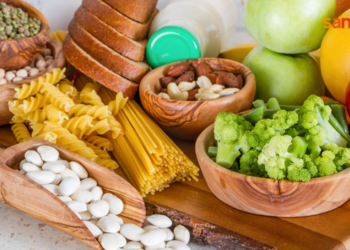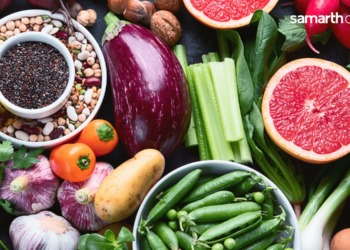Ever wondered why terrace gardening caught on with the urban population? People became aware of the impact of harmful pesticides, synthetic fertilisers, and genetically modified foods. This is confirmed by an overwhelming 69.2% of seniors who participated in our last week’s survey. Also, organic farming methods improve soil and water quality, are safe, and promote a self-sustaining resource cycle. For example, it uses plant waste and farm animals-based manure, plant rotation, natural weed control using mulch, etc.
Organic foods are an option to buy fresh or processed foods grown organically, without any harmful pesticides, fertilisers, etc. These are also free from Genetically Modified Organisms (GMOs). It’s like buying food grown in our backyards and orchards. Organic foods come with the label organic and differ from the natural label. Natural only indicates that the foods don’t have artificial colours, flavours, etc., and does not indicate how it was grown or processed.
We can have kitchen and terrace gardens. However, there is no way we can grow everything we consume. Hence, if we are particular about eating safe foods, the only option is to buy organic foods. Sadly, though, it comes with a price! Organic foods are almost always much more expensive than regular foods. So, the question often is whether it is truly beneficial to health or just a marketing gimmick.

Join Now >
Many studies suggest that organic foods have more nutrients, Omega 3 fatty acids, and lower quantities of toxic metals. Such foods also aid better digestion, and 56.4% of you have indicated that you are aware of this benefit. To gain these benefits, we would need to buy those organic foods that are worth the price. We noticed that 33.3% of seniors mentioned they regularly consume organic or Ayurvedic foods. And another 41% of them consume it sometimes.
Here is a list that can help you next time you go food shopping.
- Apples
U.S.-based Environmental Working Group (EWG) periodically comes out with a Dirty Dozen guide to suggest which foods we should buy only organic. The recommendations are based on studies about the pesticide residue levels. Can you believe that 90% of conventionally grown apples had pesticide residues, some of which Europe has banned? Since the peels are thin, this residue can easily pass into the fruit’s flesh.
Also, most apple growers apply edible wax on them, approved by the FSSAI, the Indian food safety and standards entity. This procedure is to retain moisture and freshness. This wax is not harmful when used in the right quantities as it replaces the natural ones of the apples that get removed during cleaning. However, we are never sure about the wax usage. Some organic apple growers do not apply wax on apples or only use it in allowed quantities. Checking labels can help you figure it out. FSSAI has established distinct logos for organic foods and this is your guarantee about the safety of these organic foods, which 52.5% of you were concerned about.
- Strawberries
Strawberries are a favourite in many Indian households. Apart from eating as is, they are also used in cooking and baking to make desserts. However, this fruit had high pesticide residues during sample testing. Especially when they are available off-season, it is best to buy organic ones for peace of mind and health. In any case, you only buy a box or two at most, and it is worth the price when EWG says more than 99% of samples tested had pesticide residues.
- Greens
Greens are a regular in most Indian households. Palak, amaranth, mustard and methi greens, coriander leaves, etc., are used daily in our cooking. We often use coriander leaves fresh as is without cooking also. Therefore, it is essential to ensure that they are free from pesticides. These are grown close to the ground and found to have high residues in the samples tested. Especially when you look at residues by weight, it is very high. The best part is that you can grow these easily in your kitchen garden. However, if not possible, it is best to buy organic.
- Grapes
When you buy grapes, you are never sure about the coating you see on its surface. Is it the natural coating, or is it some pesticide residue? Also, you don’t peel grapes before eating. Considering they are usually small with thin peels, how much pesticide may have gone in? There is no guarantee. EWG quoted more than 90% of samples tested as having pesticide residues. So, when you eat grapes, buy organic.
- Dairy
If you consume dairy products in limited quantities, it may be good to switch to organic products. Organic milk comes from cows not treated with antibiotics. These cows are given organic feeds through natural grazing. Organic milk and products have a higher nutrient value and Conjugated Linoleic Acid (CLA) that supports a healthy immune system. These are drug-free and undergo ultra-pasteurisation for a longer shelf-life.
While organic products are more expensive than conventional ones, some shopping tactics, like buying in bulk or with loyalty coupons, etc., can help you save money. Also, these days, many farming communities have apps from where you can directly purchase from farmers. These may be cheaper than buying from supermarkets. These tips can help you with your concerns the challenges you have indicated – high cost (79.5%), limited availability and accessibility (44.6%). Working out a monthly budget and allocating a minor amount extra for certain organic foods may be a good strategy for better health. If you find wholly switching to organic foods is affordable, consider it a blessing!









